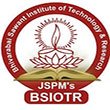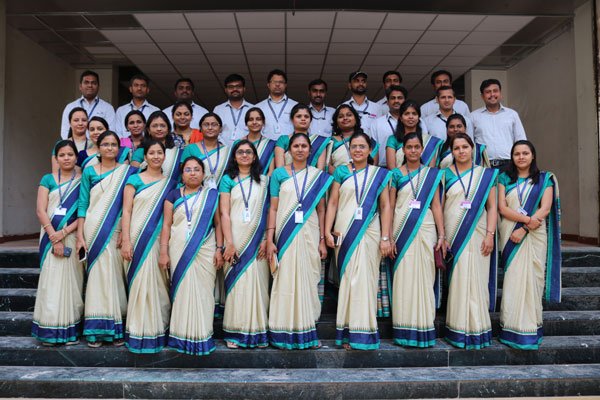JSPM's Bhivrabai Sawant Institute of Technology & Research, Wagholi, Pune
Gate No. 720/2, Nagar Road, Wagholi, Pune, Maharashtra 412207
Approved By AICTE, New Delhi, Govt.Of Maharashtra & Affiliated To Savitribai Phule Pune University
Institute is Accredited by National Assessment & Accreditation Council(NAAC), Bengaluru
and Electronics & Telecommunication, Electrical Engineering and Information Technology(IT) are accredited by National Board of Accreditation(NBA), New Delhi
Computer Engineering
The students are focused with the use of conceptual understanding of core domain areas in Computing as well as enhanced programming skills disseminating their analytical abilities. Our aim is to provide our students the life long learning and leadership skills that enable them to grow in their professions and advance to positions of responsibility by effective Industry-Institute Interaction. The Department is always trying to have an excellent placement record in prestigious software industries all over the world.
Vision
Empowering the students to be professionally competent & socially responsible for techno-economic development of society.
Mission
To provide quality education enabling students for higher studies, research and entrepreneurship
To inculcate professionalism and ethical values through day to day practices.
Strength Of Department
Committed teaching and Supporting Staff .
Well-maintained state of art academic and physical facilities.
Innovative teaching – learning process.
ICT enabled class room and seminar halls
Industry-Institute Interaction
Availability of good learning resources .
Real time application based industrial project undertaken by students and supported by industry
Goals Of Department
Enhancement in quality of outcome based teaching learning process to improve the employability skills.
Enhancement in industry sponsored learning activities like internship / training program.
Entrepreneurship promotion through center for innovation incubation and entrepreneurship.
Improvement in soft skills of the students to make them ready to face interviews, appear for the different competitive exams like GATE, CAT, GRE, TOEFEL etc.
Program Educational Objectives (PEO)
- PEO1: Graduates shall have abilities to pursue professional career.
- PEO2: Graduate shall have ability to offer effective and sustainable solutions in core and allied domains.
- PEO3: Graduate shall have ability to understand societal issues and deal consciously
Program Specific Objectives (PSO)
- A graduate of the Computer Engineering Program will demonstrate-
- PSO1: Professional Skills-The ability to understand, analyze and develop computer programs in the areas related to algorithms, system software, multimedia, web design, big data analytics, and networking for efficient design of computer-based systems of varying.
- PSO2: Problem-Solving Skills- The ability to apply standard practices and strategies in software project development using open-ended programming environments to deliver a quality product for business success.
- PSO3: Successful Career and Entrepreneurship- The ability to employ modern computer languages, environments, and platforms in creating innovative career paths to be an entrepreneur, and a zest for higher studies.
Program Outcomes (PO)
- PO1: Engineering knowledge: Apply the knowledge of mathematics, science, engineering fundamentals, and an engineering specialization to the solution of complex engineering problems.
- PO2: Problem analysis: Identify, formulate, review research literature, and analyze complex engineering problems reaching substantiated conclusions using first principles of mathematics, natural sciences, and engineering sciences.
- PO3: Design/development of solutions: Design solutions for complex engineering problems and design system components or processes that meet the specified needs with appropriate consideration for the public health and safety, and the cultural,societal, and environmental considerations. PO4: Conduct investigations of complex problems: Use research-based knowledge and research methods including design of experiments, analysis and interpretation of data, and synthesis of the information to provide valid conclusions.
- PO5: Modern tool usage: Create, select, and apply appropriate techniques,resources, and modern engineering and IT tools including prediction and modeling to complex engineering activities with an understanding of the limitations.
- PO6: The engineer and society: Apply reasoning informed by the contextual knowledge to assess societal, health, safety, legal and cultural issues and theconsequent responsibilities relevant to the professional engineering practice.
- PO7: Environment and sustainability: Understand the impact of the professional engineering solutions in societal and environmental contexts, and demonstrate the knowledge of, and need for sustainable development.
- PO8: Ethics: Apply ethical principles and commit to professional ethics and responsibilities and norms of the engineering practice.
- PO9: Individual and team work: Function effectively as an individual, and as a member or leader in diverse teams, and in multidisciplinary settings.
- PO10: Communication: Communicate effectively on complex engineering activities with the engineering community and with society at large, such as, being able to comprehend and write effective reports and design documentation, make effective presentations, and give and receive clear instructions.
- PO11: Project management and finance: Demonstrate knowledge and understanding of the engineering and management principles and apply these to one’s own work, as a member and leader in a team, to manage projects and in multidisciplinary environments.
- PO12: Life-long learning: Recognize the need for, and have the preparation and ability to engage in independent and life-long learning in the broadest context of technological change.
Vision
"Empowering the students to be professionally competent & socially responsible for techno-economic development of society. "
Mission
- A. To provide quality education enabling students for higher studies, research and entrepreneurship
- B. To inculcate professionalism and ethical values through day to day practices.
Computer Engineering Student Association
| Sr.No. | Name | Designation |
|---|---|---|
| 1 | Prof. Madhavi Kulkarni | CESA Coordinator |
| 2 | Mr. Rutik Shelar | President |
| 3 | Mr. Ritesh Shah | Vice-President |
| 4 | Mr. Pratik Pawar | Secretary |
| 5 | Mr. Gaurav Dokhchaule | Treasurer |
| Technical Committee | ||
| 6 | Mr. Vishal Abhange | Head |
| 7 | Mr. Shubham Nile | Technical Committee Member |
| 8 | Mr. Shubham Jadhav | Technical Committee Member |
| 9 | Mr. Alok Singh | Technical Committee Member |
| 10 | Mr. Vishal Gaikwad | Technical Committee Member |
| Cultural Committee | ||
| 11 | Mr. Shubham Sawant | Head |
| 12 | Ms. Gauri Wankhede | Cultural Committee Member |
| 13 | Ms. Aastha Pratap Dhokale | Cultural Committee Member |
| 14 | Mr. Pravin Bagwale | Cultural Committee Member |
| 15 | Ms. Sanika Khamkar | Cultural Committee Member |
| Sports Committee | ||
| 16 | Mr. Swaraj Jadhav | Head |
| 17 | Ms. Gauri Rawas | Sports Committee Member |
| 18 | Mr. Ashish Khatode | Sports Committee Member |
| 19 | Mr. Aditya Pawar | Sports Committee Member |
| 20 | Mr. Aditya Jadhav | Sports Committee Member |
| 21 | Mr. Shritej Sankpal | Sports Committee Member |
| 22 | Mr. Omkar Gidvir | Sports Committee Member |
| 23 | Mr. Abhishekh Karhade | Sports Committee Member |

.png)

Programming lab -2
Programming Lab-2 is used for performing laboratory assignments on subjects of Data Structures and Algorithms. These assignments ...
Read MoreSoftware Development Tools Laboratory
Software Development Tools Laboratory is utilised for conducting practical assignments on Laboratory Practise 1 and 3. Here stude ...
Read MoreProgramming lab -1
Progarmming Lab 1 is used for condcuting practical sessions on Object oriented programing and Computer Graphics Lab. These practi ...
Read MoreVisual Programming Lab
Database Management System is the core subject or domain in Computer Engineeering Syllabus. In this lab all database related appli ...
Read More